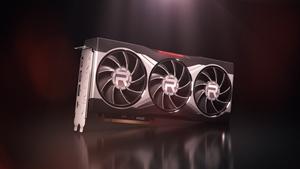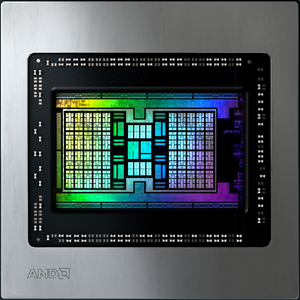4 AMD internal modeling based on graphics-engine-only measured average gaming power consumption and 3DMark11 power consumption vs. frequency for RX5700 XT and RX 6900 XT divided by the number of compute units (40 and 80 respectively). RX-536
5 Measurement calculated by AMD engineering, on a Radeon RX 6000 series card with 128 MB AMD Infinity Cache and 256-bit GDDR6. Measuring 4k gaming average AMD Infinity Cache hit rates of 58% across top gaming titles, multiplied by theoretical peak bandwidth from the 16 64B AMD Infinity Fabric channels connecting the Cache to the Graphics Engine at boost frequency of up to 1.94 GHz. RX-547
6 Based on internal modeling and testing done by AMD engineering labs 10/5/2020 on Radeon RX 6800 XT with 128 MB of AMD Infinity Cache vs a Radeon RX 5700 XT graphics card measuring memory latency. Performance may vary. RX-564
7 Based on internal modeling and testing done by AMD engineering labs 10/5/2020 on a Radeon RX 6800 XT vs a Radeon RX 5700 XT, using measurements taken of Cac, frequency at same power uplifts, and AMD Infinity Cache uplifts. Performance may vary. RX-566
8 AMD Smart Access Memory is only supported on AMD Radeon RX 6000 series graphics cards. Not validated on any other graphics solutions. GD-178.
9 Testing done by AMD performance labs October 18 2020 on Radeon RX 6800 XT (20.45-201013n driver), RTX 3080 (driver 456.71), AMD Ryzen 9 5900X (3.70GHz) CPU, 16GB DDR4-3200MHz, Engineering AM4 motherboard, Win10 Pro 64. The following games were tested at 4k at max settings with RAGE MODE + SMART ACCESS MEMORY enabled and disabled: Borderlands 3, best API Ultra; Doom Eternal, Vulkan Ultra Nightmare; Forza Horizon 4, DX 12 Ultra; Gears 5, DX12 Ultra; Hitman 2, DX12 Ultra; Resident Evil 3, best API, Ultra; Wolfenstein: Young Blood, Vulkan Mein Leben. Performance may vary. RX-559
10 AMD’s product warranty does not cover damages caused by overclocking, even when overclocking is enabled via AMD hardware and/or software. GD-26
11 Radeon™ Anti-Lag is compatible with DirectX 9 and DirectX 11 APIs, Windows 7 and 10. Hardware compatibility includes GCN and newer consumer dGPUs Ryzen 2000 and newer APUs, including hybrid and detachable graphics configurations. No mGPU support GD-157
12 Game clock is the expected GPU clock when running typical gaming applications, set to typical TGP (Total Graphics Power). Actual individual game clock results may vary. GD-147
13 Boost Clock Frequency is the maximum frequency achievable on the GPU running a bursty workload. Boost clock achievability, frequency, and sustainability will vary based on several factors, including but not limited to: thermal conditions and variation in applications and workloads. GD-151
Contact
s
:
George Millington
AMD Communications
(408) 547-7481
Email Contact
Jason Schmidt
AMD Investor Relations
(408) 749-6688
Email Contact
Photos accompanying this announcement are available at
https://www.globenewswire.com/NewsRoom/AttachmentNg/8d2c8fbe-ce61-40ba-ba38-2b7ee6f62c99
https://www.globenewswire.com/NewsRoom/AttachmentNg/56b9f51f-b313-41a3-9fc1-0f1bf766c3d4











